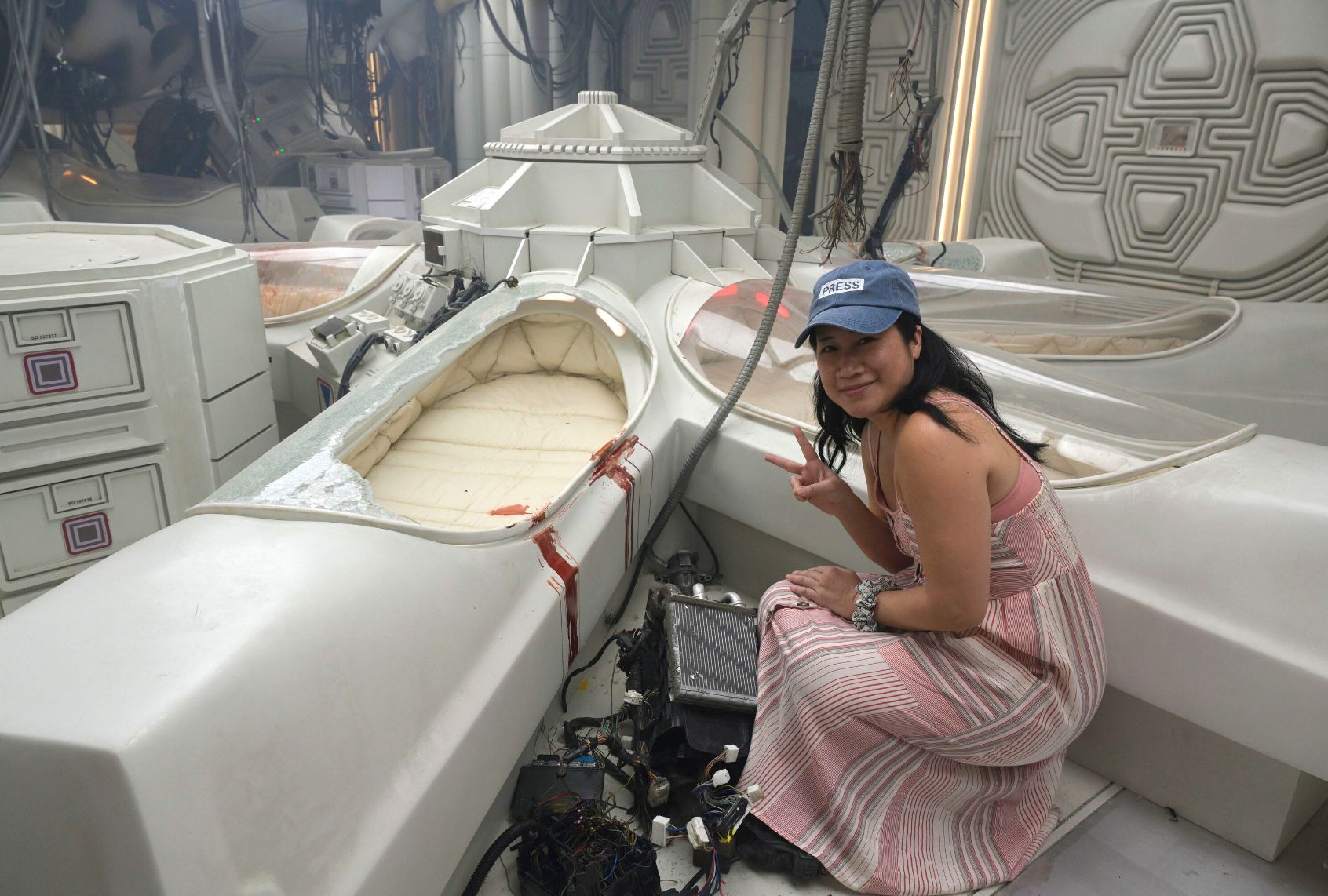The blood trail led out of the room and into the hallway. With half trepidation, half glee I tiptoed over the wide red smear, following it to its source: a crime scene in space. I’d arrived on the set of “Alien: Earth.”
In April 2024, I joined a group of international journalists in Thailand for a sneak peek of Noah Hawley’s TV series set in the world of “Alien.” While the “Fargo” creator had already had success in taking a film and building it out for episodic storytelling, tackling such a beloved sci-fi franchise for this treatment still felt like a huge risk. After all, here be xenomorphs . . . and a devoted fandom. It remains to be seen which would be more vicious.
“You can see that a chestburster came out.”
Set in 2120, “Alien: Earth” examines what happens when the USCSS Maginot spacecraft crash-lands onto our planet. Clearly some mishap befell this crew, which was foolish enough to sign up for a Weyland-Yutani mission in the first place. Going to sleep in the cryochamber – with its pods radiating outward like the petals of a suspended animation daisy – was their second mistake. In Ridley Scott’s 1979 film “Alien,” the crew of the Nostromo rouses from slumber to answer a distress call that spells their doom. The James Cameron-directed sequel brings Sigourney Weaver’s Ripley out of stasis after 57 years to face off with the critters once again.
This setting was where my fellow reporters and I found ourselves laughing and peering into the various cubicles, afraid of what we might find. The entire cryochamber was surprisingly spacious, the better to lull you into a false sense of security about your means of escape.
“It’s three times the size of the Nostromo’s,” production designer Jason Knox-Johnston told us. “This is post-crash, obviously, otherwise, it’s bad housekeeping. And we’ve basically got the crew here, and they’ve died in horrendously gruesome ways. We’ve got one here . . . You can see that a chestburster came out, he jumped out and ran out, sort of similar things to the original [film].”
A few of the glass doors of the sleep capsules had been shattered, and dark blood stains stood out starkly against the white beds and walls. One poor crewman’s pod looked as if Sweeney Todd had not yet cleaned up his workspace. This artful carnage felt even more disturbing because of its familiar trappings; standing on the Maginot set looked and felt as if we were aboard the Nostromo. The series takes place approximately two years before the original film’s events and therefore heavily draws from that aesthetic for the Maginot.
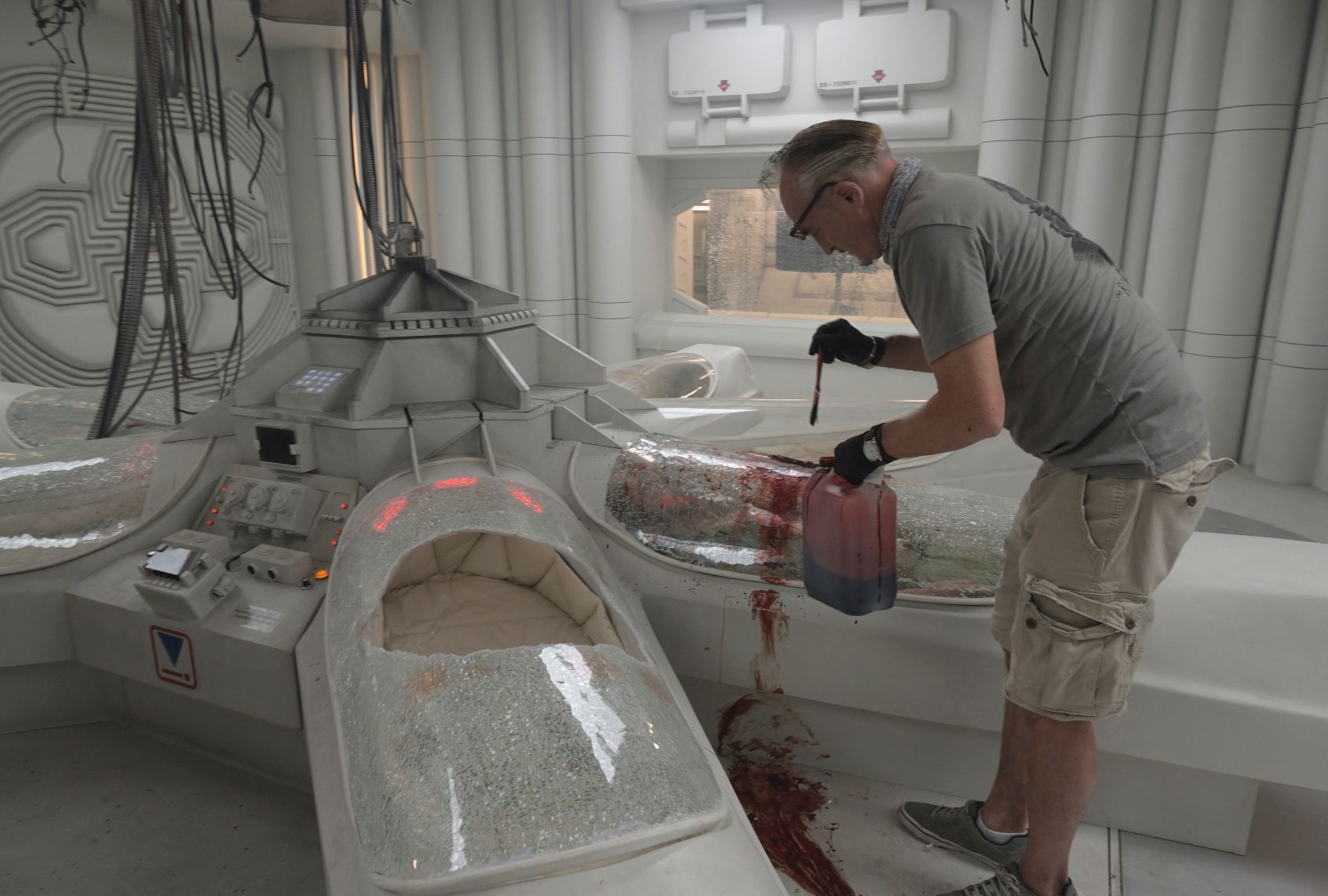
(FX) The art and science of applying fake blood in the Maginot cryochamber set for “Alien: Earth”
Hawley pointed out, “None of us have ever been in space. I think what Ridley managed to do in that first film was to create a workplace that we could identify with, because it might as well have been a factory for all that we knew on the inside. So that made it recognizable, and very different than the Star Trek, Apple store aesthetic, or even the Star Wars ripping yarn adventure tale. It felt real. Everything was dripping. It was rusty. It just felt real to us here on Earth.”
The series’ American and local Thai crew worked together to go through “Alien” frame by frame to recreate that specific retro-futuristic look for the Maginot, complete with tactile hulls and cathode-ray tube screens.
“It is heavily aged, it’s worn,” said Knox-Johnston. “It’s that aesthetic, which they pioneered really between ‘Star Wars’ and [‘Alien.’] They pioneered that beaten-up sci-fi look. And interestingly enough, Roger Christian was the set decorator of ‘Star Wars.’ He was then hired by Ridley, because I think Ridley said, ‘I want the Millennium Falcon look for Nostromo.’ So they hired him, which is why there’s a similar detailing going on in ‘Star Wars’ aesthetically and this one.”
Eventually, the crew was able to get their hands the original concept art for the Nostromo through Marjorie Chodorov at Scott Free who sourced the 50-year-old drawings from Disney. “But by the time we got those, the only set we had left to build was the mess hall that you walked into, which was part of the zoo lab,” said production designer Andy Nicholson. “But the rest of it was all [made from] studiously looking at the [original] film frame by frame.”
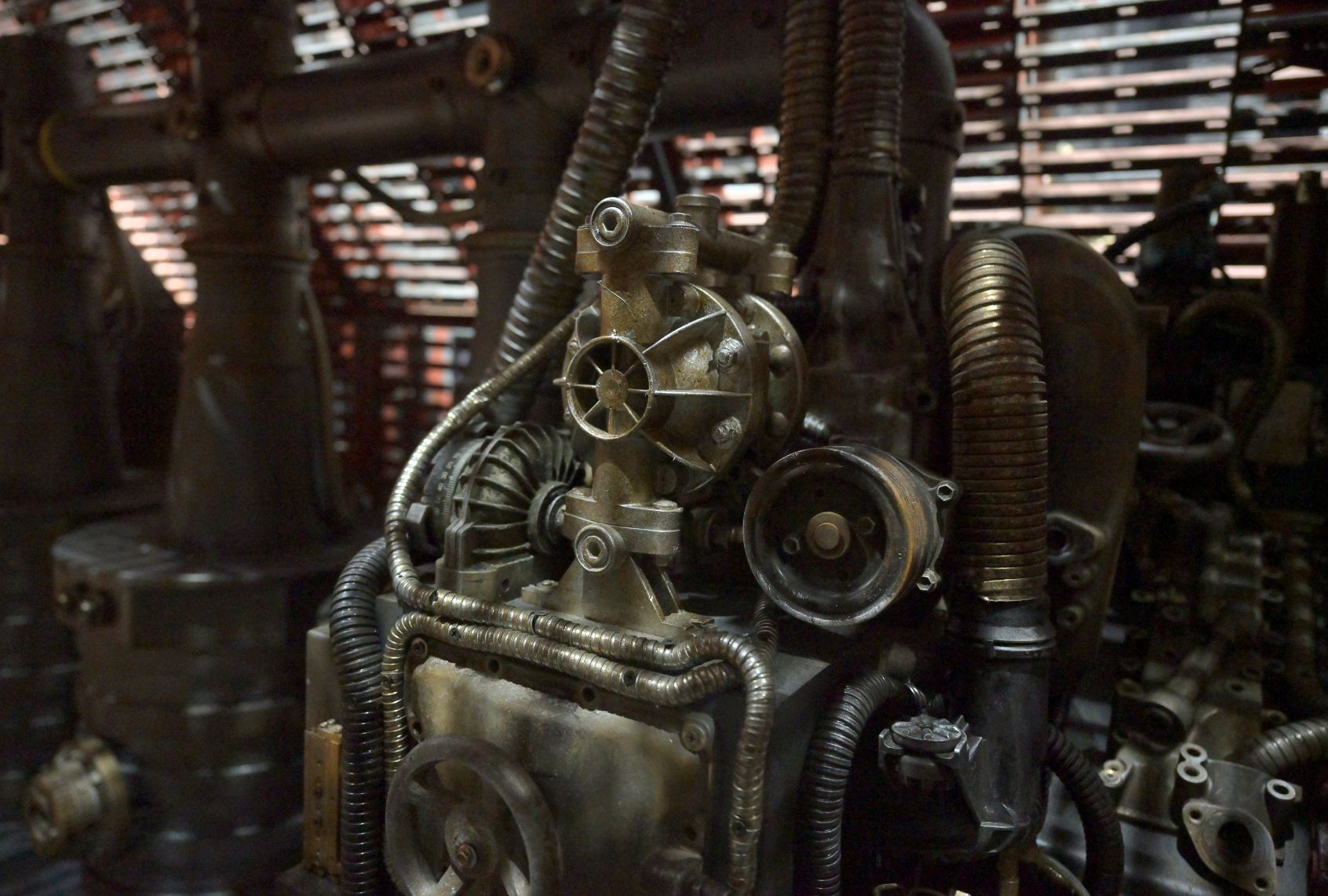
(FX) Light filters through the pallets used on the walls of the Maginot on the set of “Alien: Earth”
While the cryochamber, mess hall and winding hallways mirrored the white colors we associate with “Alien,” the cargo bay and other darker areas posed a unique challenge to recreate.
“The shipping pallets were the key to everything.”
“One of the most difficult things about studying ‘Alien’ as a movie, was that no digital pictures were taken,” said Nicholson. “The set pictures are very limited online everywhere, even on enthusiasts’ pages. The film’s so dark, trying to figure out what stuff took a long time. I started doing research into really nerdy stuff, and the perforated walls you see in the dark corridors are shipping pallets.”
While these pallets had been used on other films before such as on “Star Wars” for flooring, the use of them for the walls created a different feel in “Alien.” Unfortunately, most of the pallets from the ’80s had been sold off, which led the production to make their own.
“The shipping pallets were the key to everything, because once you figured out, you see them everywhere,” Nicholson added. “We had to recreate all of that stuff, but it made such a difference to the texture of the show. Huge respect for the design choices that they made on that, just by doing something that you’re able to backlight like that.”
Earth 2120 and the question of humanity
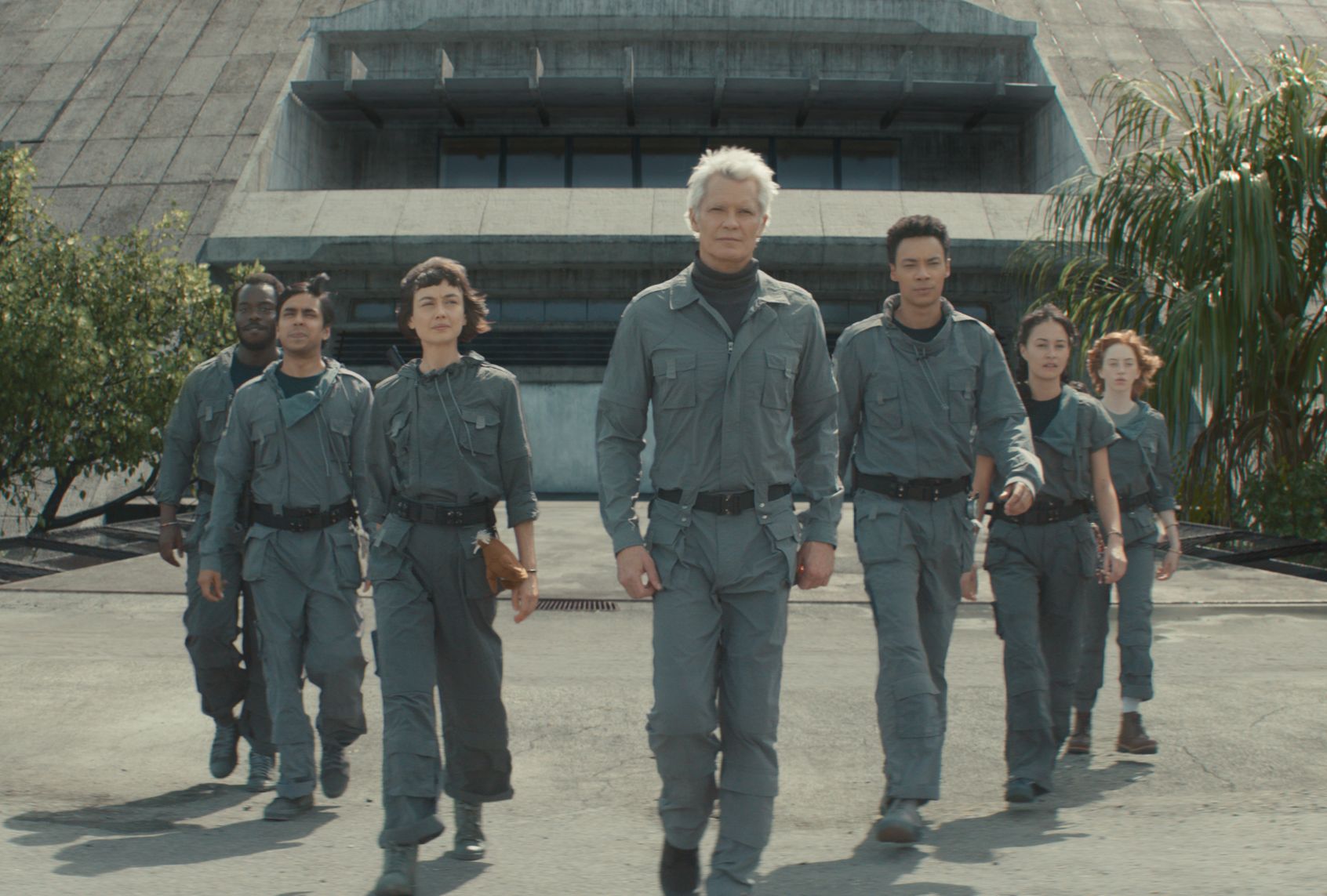
(FX) FX’s Alien: Earth – Pictured: (l-r) Jonathan Ajayi as Smee, Adarsh Gourav as Slightly, Sydney Chandler as Wendy, Timothy Olyphant as Kirsh, Kit Young as Tootles, Erana James as Curly, Lily Newmark as Nibs. CR: FX
Removing space from the “Alien” equation meant that Hawley had to envision what Earth 2120 looked like, and apparently, part of it looked like Thailand. Who knew that by eating at the Bangkok night markets and whizzing through traffic on the back of scooters on this trip I was already living in the future?
And even though Ridley Scott directed both the futuristic “Alien” and “Blade Runner” – that latter which drew on Japanese imagery for its cyberpunk world – Hawley didn’t want his show to be compared to that film, despite both having Asian countries that influenced the backdrops.
“I have said more than once to my design team, ‘If we’re making “Blade Runner,” we’re making the wrong Ridley Scott movie,'” he said. “You’re never on Earth in any of the ‘Alien’ movies, and so it’s left to me to figure out what Earth would be like. I certainly think if it’s the Earth of our future, it’s going to be a hotter, wetter place. It’s part of the reason that we’re in Bangkok right now. ‘Blade Runner’ as a rain-soaked environment, I chose not to do that per se, but there is some overlap.”
If the Xenomorphs didn’t get us, the temperature and humidity surely would. Before our arrival we were given careful instructions to pack light clothing, heavy sunscreen and lots of electrolytes lest we risk heat stroke or dehydration. Our group embarked on the set visits early in the morning in order to be finished before the worst of the day’s heat. The humidity even worked itself into the storytelling.
“In this particular future, this part of the world is very much, much hotter and much, much wetter,” said Knox-Johnston. “So the architecture suffers from mold and damp, and it’s a constant battle to fight that. So that’s why we have you’ll see down in here, we have these little fittings everywhere, and we have the hulking guys that scrape mold off the walls. It’s a constant battle to try and fight this encroaching damage.”
“If we’re making ‘Blade Runner,’ we’re making the wrong Ridley Scott movie.”
In this future, five major corporations govern the planet, and this means that Weyland-Yutani has competition. Besides Dynamic, Lynch and Threshold, the young and wealthy genius known as Boy Kavalier (Samuel Blenkin) runs Prodigy out of Prodigy City, in the region of New Siam (Siam was the name of Thailand before 1939). Hawley said that the idea of a corporatocracy was always baked into the franchise.
“I don’t think that in the ‘80s and the ‘70s, they could have envisioned the Elon Musks of the world at that point,” he said. “But we’re in a different era, and I felt like in order to make it feel contemporary, we needed to address that idea that this whole thing is sort of the whim of this prodigy, and that what you get in a corporation is a diffused decision system where nobody actually decides. It’s nobody’s fault, and therefore it doesn’t have to be a human decision. I think what we’ve reached now is something worse in a way.”
Since the beginning, the “Alien” franchise has probed the bounds of what we considered humanity. With the TV series, we see three ways that these corporations have offered answers to the race for immortality. We are already familiar with cyborgs and the use of artificial intelligence androids, or synths, which we’ve seen time and time again in each movie. In this series, Timothy Olyphant plays a synth named Kirsh, who sports a shock of white hair. “I wanted to make it up to Tim for casting him as a U.S. Marshal [in ‘Fargo’], the same way that everyone else has cast him, so I decided to make him a completely different character,” said Hawley.
Boy Kavalier, however, pioneers a new type of being: a hybrid, created from a human consciousness transplanted into a synthetic body. We see this with the young girl Wendy, who’s been transferred into the body of a synthetic adult woman (Sydney Chandler), with superhuman abilities. Check out her introduction in the trailer below:
Wendy is the first of Prodigy’s hybrids, all children who are thrust into manufactured adulthood. They’re being raised and studied on Neverland Research Island, a name that doesn’t give off creepy Dr. Moreau vibes at all. Beyond that, of course, are the references to J.M. Barrie’s “Peter Pan,” which interrogates the idea of holding onto youthful innocence. Wendy’s fellow hybrids are named after many of the Lost Boys (Peter Pan’s friends not the ’80s film about delinquent vampires). Fortunately, the 1953 animated film adaptation of “Peter Pan” happens to comes from Disney, which also owns FX.
“It’s just the evolution of a creative idea – this conflict between biology and the synthetic, which is what humanity is trapped between, and does humanity deserve to survive?” said Hawley. “Then there’s the thought, ‘Well, who’s more human than a child?’ They don’t know how to pretend they’re not scared. They’re bad liars. Then you think, ‘James Cameron’s movie has a literal child in it, but she’s so much more mature than Bill Paxton, who’s like a child in an adult’s body.'”
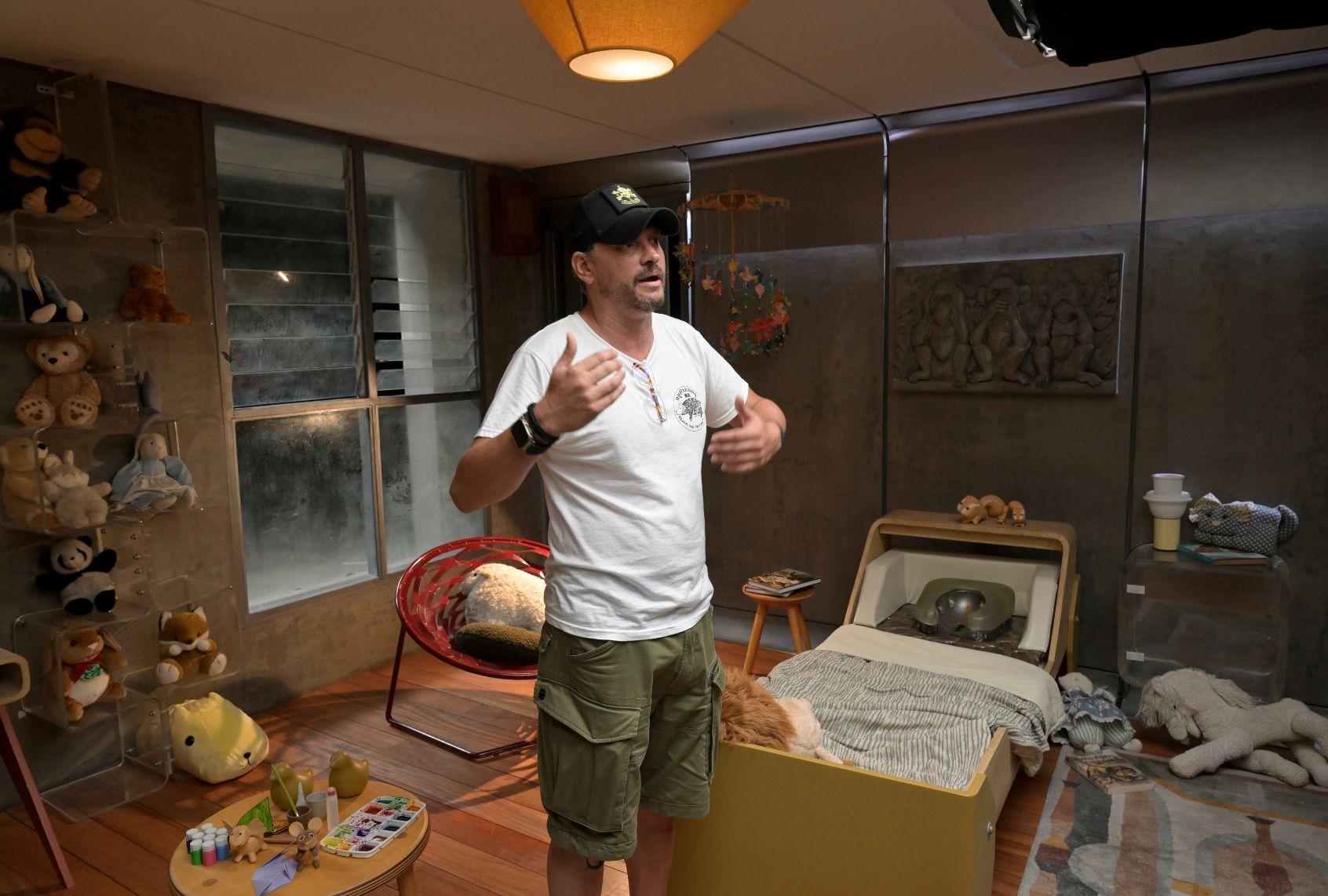
(FX) Production designer Jason Knox-Johnston in the hybrid dorm room on the set of “Alien: Earth”
Despite Newt, the introduction of children as regular characters feels almost audacious for this horror franchise. And even though I will have seen a range of fake gore and alien creatures on this three-day set visit, I found stepping into the hybrid dorm rooms was the most unsettling experience overall. Contrasted with the concrete walls are a single bed, plushies (Is that a squishmallow?!) and simple arts and crafts projects more befitting a child than someone who can easily jump off a cliff unscathed.
“This is our standard room for our hybrids,” said Knox-Johnston.” The first thing you’ll notice is there’s a lot of childlike dressing in here, because obviously, they’re just children in adult bodies. Then also, you’ll notice the strange pillow, which is a charging pillow, when they rest on the bed, they’re recharging their powerbanks.”
The making of the monsters
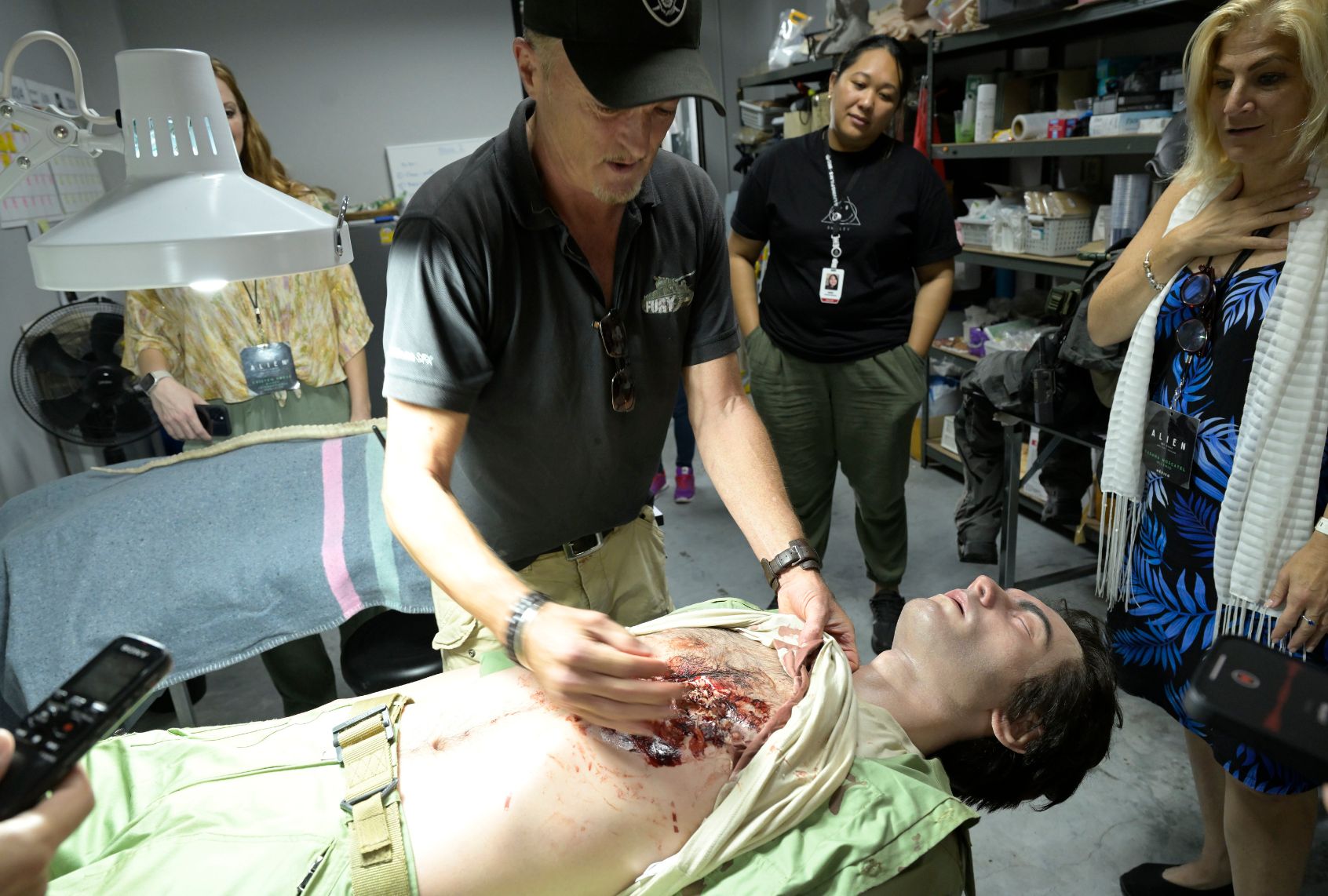
(FX) Lead prosthetics supervisor Steve Painter shows off one unfortunate “Alien: Earth” victim
By the third day of the Bangkok set visit, we’d seen our fill of spaceships, consoles, props, costumes and wigs. But where was our Xenomorph? Where were the literal aliens?
To ease us into that promised main event, we first swung by the prosthetics department, where we learned the secrets to fake blood and gazed upon a number of body parts. Steve Painter, the lead prosthetics supervisor/designer, was the most chipper, cheerful person we had met all week.
“Welcome to the Gory Boys! This is where everyone dies. Basically, we kill everyone in this series,” enthused Painter. “Some of it, as you can see, is pretty gory, horrific deaths. Some caused by the Xeno, some by other creatures, some by humans, who are the real animals.”
Having worked on “Saving Private Ryan” and a number of other war films, this was a man who didn’t shy away from gore and loved his job. With very little context, Painter launched into a story about his morning.
“I walked on set, and we have a corpse on set that’s – I’m not going to give too much of the plot away – but [the body is] bashed over a console and across the bridge by a Xeno,” he said. “Within 20 seconds he’s in two halves: one half’s over there; this half’s here. So we took on the bucket of giblets, the blood, the guts, and we just created it there and then.”
We left him to his gruesome toys and later found our way to the Second Skin, Thailand’s local creature effects company. As the “Alien: Earth” trailer revealed, five specimens were picked up by the Maginot, which Knox-Johnston compared to Charles Darwin’s Beagle expedition. Although the Xenomorph and its facehugger form were already familiar to viewers, the trailer also revealed two more: the creatures referred to as the Orchid and the Eye Midges, which has strong tentacles.
Although I was able to see these new aliens, which were crafted using practical effects, alas details about those creatures will have to remain under wraps for now, to be revealed after the series premieres. Knox-Johnston confirmed that these are just some of the creatures we would find on the set of the zoo lab, which is a new addition to the Maginot that was not part of the Nostromo.
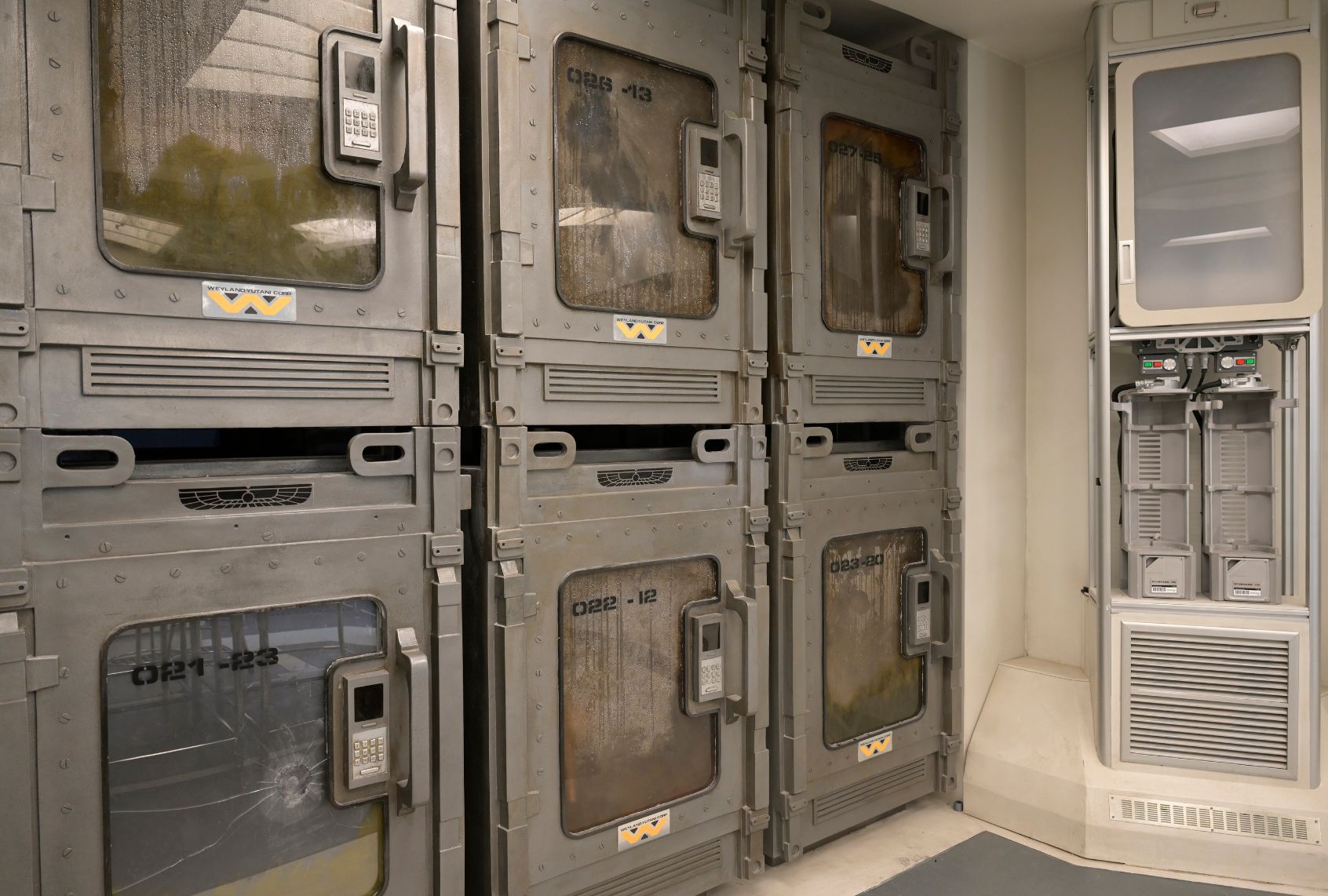
(FX) The Maginot zoo lab where specimens are kept on the set of “Alien: Earth”
“This is the zoo lab. This would be the botanist’s room on the Beagle,” he said. “Basically, this is where they store the organic samples they’ve reclaimed on their trip. And they bring them in specifically to these containers here, to the secure containers. And they’ll bring them out, and this is where they do the autopsies, the examinations.”
Saving the best for last, we ended the set visit getting up close and personal with some Xenomorphs and its younger form, the Facehugger. Using animatronics and other tools, many of these practical critters moved and appeared to even breathe, causing more than a few of us to scream in surprise. (As with the Orchids and Eye Midges, photos for this portion of the set visit will be held until after the series premieres.)
Not having ever met a Xenomorph before, I was not entirely certain how these new ones were different from what came before. Hawley claimed that even though he honored the original design, he still needed to innovate a little for this series.
“In the design phase with Wētā [Workshop], I didn’t want to mess with the silhouette of the creature at all,” he said. “I felt like the audience wants that classic – but then, within that, I felt like I wanted to experiment with a couple of ideas about the creature. In ways, I always felt like it was the least effective when it looked like a guy in a suit. In the classic, there’s just this big ribcage, which feels very human to me, so I wanted to try to minimize that and play around with some other ideas. That was a very fun process to work on with Wētā.
“And then . . . what color is it?” he continued musing. “It’s very black in the movie. I wanted to play into more of the bug-like quality of it, so maybe it falls a little more in the roach coloration. Those ideas. You can get in trouble for keeping it the same and you can get in trouble for changing it, so I figure I’ll just be in trouble for whatever.”
As a former Houstonian, I can attest that the only thing more detestable than a roach is a flying roach. I only bring this up because director/cinematographer Dana Gonzales revealed the lengths to which the team went to make the Xenomorph even more frightening.
“I think we designed something that is very photographable and scary and detailed,” he said. “I don’t know if some of the older movies had some of the stunt techniques that we have now, the wire work, and the fact that we can kind of fly the Xeno around and stuff like that. So it’s not so much just coming out and scaring you and having that kind of jump scare. It’s literally flying through the air. It’s chasing.”
Ridley Scott’s chestbursters scurried so that Noah Hawley’s Xenomorphs could fly. Perhaps it’s best I didn’t get to see that on set. If I had, I would be deceased and writing this dispatch from the other side. Check back for more of Salon’s reporting from the “Alien: Earth” set.
FX’s “Alien: Earth” will premiere on Tuesday, Aug. 12, with the first two episodes available to stream on Hulu at 8 p.m. ET and on the FX linear channel at 8 p.m. ET/PT, and on Disney+ internationally.
Read more
about the “Alien” franchise
